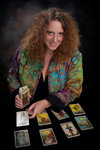Is Study a Dirty Word?
 Each tarot teacher has a unique way of teaching, and each student a unique way of learning. Tarot is expansive and diverse. That’s one of the things that makes it wonderful. There are countless decks, traditions, books, interpretations and reading styles. There are countless ways to learn tarot, to read tarot, and to use tarot.
Each tarot teacher has a unique way of teaching, and each student a unique way of learning. Tarot is expansive and diverse. That’s one of the things that makes it wonderful. There are countless decks, traditions, books, interpretations and reading styles. There are countless ways to learn tarot, to read tarot, and to use tarot.
When I teach tarot, it is my goal to help each student discover how he or she reads tarot best.
When you learn tarot, you need to discover how the cards speak to you, and how the cards work for you. It’s my job to help you do that.
I don’t think we should be confined to a particular tradition, or a particular set of interpretations. I do believe that intuition is a huge part of effective tarot work.
Some tarot teachers suggest there is no need to learn traditional interpretations, key words, associations, history or theory. Some go as far as to say that learning these things will actually impede the intuitive process.
It is true that some gifted students can look at the cards and simply read them based on the images and their intuition. There are even professional readers who do this – those who have never actually studied the cards but still deliver great readings with the cards.
There is nothing wrong, and everything right, with using tarot as an intuitive tool.
But when we refuse to delve into the rich history of tarot tradition to help us find more, see more and understand more, we do tarot, and ourselves, a disservice.
When teachers encourage their students not to study, and not to learn traditions, they do their students a disservice.
If we stop growing as readers once we learn a few key words and book interpretations, we will never become great readers. But if we refuse to take the time to study and memorize those key words, we will also miss the opportunity to become great readers.
Tarot is interpretive and intuitive. The more we learn about traditional meanings of each card, the more support we give our intuitive process.
I once took a class in modern creative writing. Our first assignment was to write a traditional Elizabethan sonnet. I was shocked and dismayed, until the teacher explained his reasoning to me. If you want to break the rules, you have to know the rules first.
In today’s world of smartphones with Google and Wikipedia in our pockets, many of us have forgotten the value of old-fashioned study and memorization. Many of our teachers say learning isn’t as important as experiencing. Somehow, study has become a dirty word.
It is important that our understanding of tarot not be didactic. The cards do mean different things to different people. That is how it should be. But it is important to know why the cards mean what they do to us.
To learn the wisdom of the elders that came before us gives us roots in solid tradition. From those roots, we sprout new branches that will move tarot understanding into the next generation, and give each of us our unique styles and perspectives.
Without those roots, tarot becomes just a pack of pretty pictures.
The process of study and memorization is meditative, and supportive of intuitive growth. When we spend time with each card, learning about it, writing about it, and thinking about it, we are doing more than memorizing it, we are developing a relationship with it. There is no substitute for this process, arduous though it may be.
The rewards of this process, however, are undeniable.
